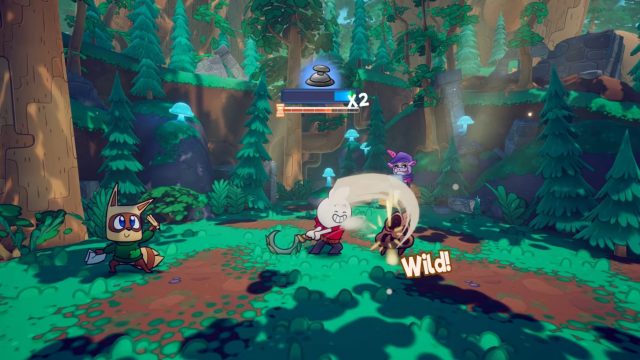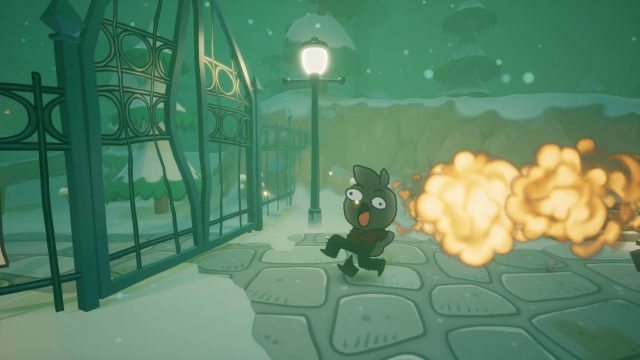Great artistic direction in the visuals; sound design, and score; a fun, quirky world that the goofier of gamers will appreciate.
Combat mechanics and a story that falls short.
Welcome to another Backlog Review, where we take a look at an older game that fans might have sitting waiting to be played or are still considering giving a purchase. This time we’re looking at Born of Bread.
I’ve never played Paper Mario or any of the Paper Mario-like games to come after. This meant that when playing Born of Bread I didn’t have any of the nostalgia to draw me in, nor did any of the borrowed elements from Paper Mario have the potential to impress me as a first time player. Born of Bread mixes various elements that I appreciated independently, yet did not make it greater than the sum of its parts.
You play as Loaf, an accidental creation thrust into adventure. Loaf rises out of the oven after the castle baker is ordered to follow a recipe from a mysterious book. To everyone’s surprise and disbelief, a carefree bread boy pops out. If you’re Japanese or an avid anime fan, I may have just conjured the image of Anpanman, but the similarities end there.
Out of mere coincidence, the story’s villains crash the castle when you and the baker appear before the queen, and she falsely convicts your baker papa for causing the destruction. It’s now up to you to clear his name and discover what motivates these mysterious purple enemies as you explore the wacky world.
Right away, I appreciated the visuals, sound design, and music. The game world is colorful and stylistic, and the 2D characters feel at home in the 3D environment. Moving around and interacting with items was smooth and satisfying. This includes talking to NPCs, smashing objects with Loaf’s ladle, or having your companions use their special skills to uncover items or make previously inaccessible areas accessible. My main source of frustration in traversing the game was the scattered but unnecessarily challenging platforming. Being flat in a three dimensional word makes jumping annoying. While you can change the settings so falling into water doesn’t cause you to take damage, it was more so the repetition after failure than the damage I dreaded.
Platforming wasn’t the only mechanic I was unprepared for. While I was initially impressed by the resourcefulness of the bag of mechanics the developers pulled from, the interest quickly faded as the novelty wore off. Loaf has limited space in his pack and the weapons he finds come in various shapes that you then have to “tetris” into your bag or else decide which ones you can’t use in combat. Although this is a mechanic I enjoyed in Dredge and it is similar to the management elements in Moonlighter, another game I love, it lacked the same enjoyment here in a way I can’t fully articulate. It just didn’t feel fully fleshed out.
Combat is another mechanic that quickly became tedious. Most of it is turn based in the ways gamers have come to expect. When a turn based game forces you to regularly encounter enemies, most fights should either be routine enough that I can phase out while my mind focuses on planning out other tasks, or incredibly engaging and full of strategy. Born of Bread tries to keep players engaged with quick time events tied with the attacks that deal more damage. I did not like these.
I am a bit critical of recent Pokémon games and the combat not being challenging enough for adult players who have grown up with the series, but even those games have much more strategy than Born of Bread. Sure, they do have decades of development to build off of, but in Born of Bread’s combat, I didn’t feel like which moves I chose or my choices overall really mattered. There are combat elements making certain move types do more damage on particular enemies, but it wasn’t crucial enough to learn so I didn’t bother.
Any of the interesting moves require points (WP) to use that don’t easily regenerate automatically. You’d think this would mean carefully choosing when to use them, or when to block to refill them, but I would almost always level up and have all my health and combat points refresh right as I was running low. If you start running low before you are near a level up, you can easily solve this with consumable items.
Frustratingly, however, you can’t hold many of these consumables. Frustrating because I hate leaving things behind (it is my sarcastic opinion that gamers who can walk past coins in a Mario game are psychopaths). Yet, regenerative consumables are so plentifully scattered in the game that I would usually consume something in my inventory so I wouldn’t leave this new snack behind. I would have much preferred larger inventory space to fill with more carefully collected items that I used as needed.
So while the game could have challenged players by having them painstakingly choose when to use stronger or specialized attacks, players can instead freely use them whenever and have to occasionally consume items so they can continue using the attacks they regularly utilize anyway. Consuming items to restore your WP ends up feeling more like a constant tax to pay to fight enemies rather than a strategic gameplay element. This, combined with tedious quick time events that didn’t make the combat more immersive, led me to just try harder to avoid enemies.
Avoiding enemies in turn-based combat games isn’t unusual. We’ve all tried to do it at least occasionally and it’s often why people dread game areas with random encounters, with those areas often becoming players’ least favorite locations. An engaging narrative would have made up for this, but how does Born of Bread’s story hold up?
I enjoyed the bread puns. I enjoyed the quirky, silly characters and the unserious world. In games, a story can be lighthearted and fun while still engaging the player and make them curious to know where it will take them. Sadly, Born of Bread falls short. I found the short glimpses we are given of the antagonists more interesting than the escapades of the protagonists. I would much rather have played the game from their perspective. And at times you do, but these moments are short.
To keep gamers playing, there needs to be engaging, fun gameplay that appropriately challenges and rewards them or a provoking story that forces players to continue to see how the game pans out. Born of Bread unfortunately lacked in both these areas. This doesn’t make it a bad game, it’s good, but it doesn’t live up to the potential I see it could have had.
Usually, when we say a game is “fun,” we mean it is fun for the player to play. Born of Bread is a game that is fun in that sense. It is cute, colorful, quirky, punny, and witty. The developers clearly enjoyed themselves while making it. Characters make funny faces and have fun designs. It’s a silly game in the best sense. I likely would have enjoyed it as a kid. But when it has to stand against my adult criticisms, I unfortunately find it lacking.
Nintendojo was provided a copy of this game for review by a third party, though that does not affect our recommendation. For every review, Nintendojo uses a standard criteria.




 ShareThis
ShareThis








